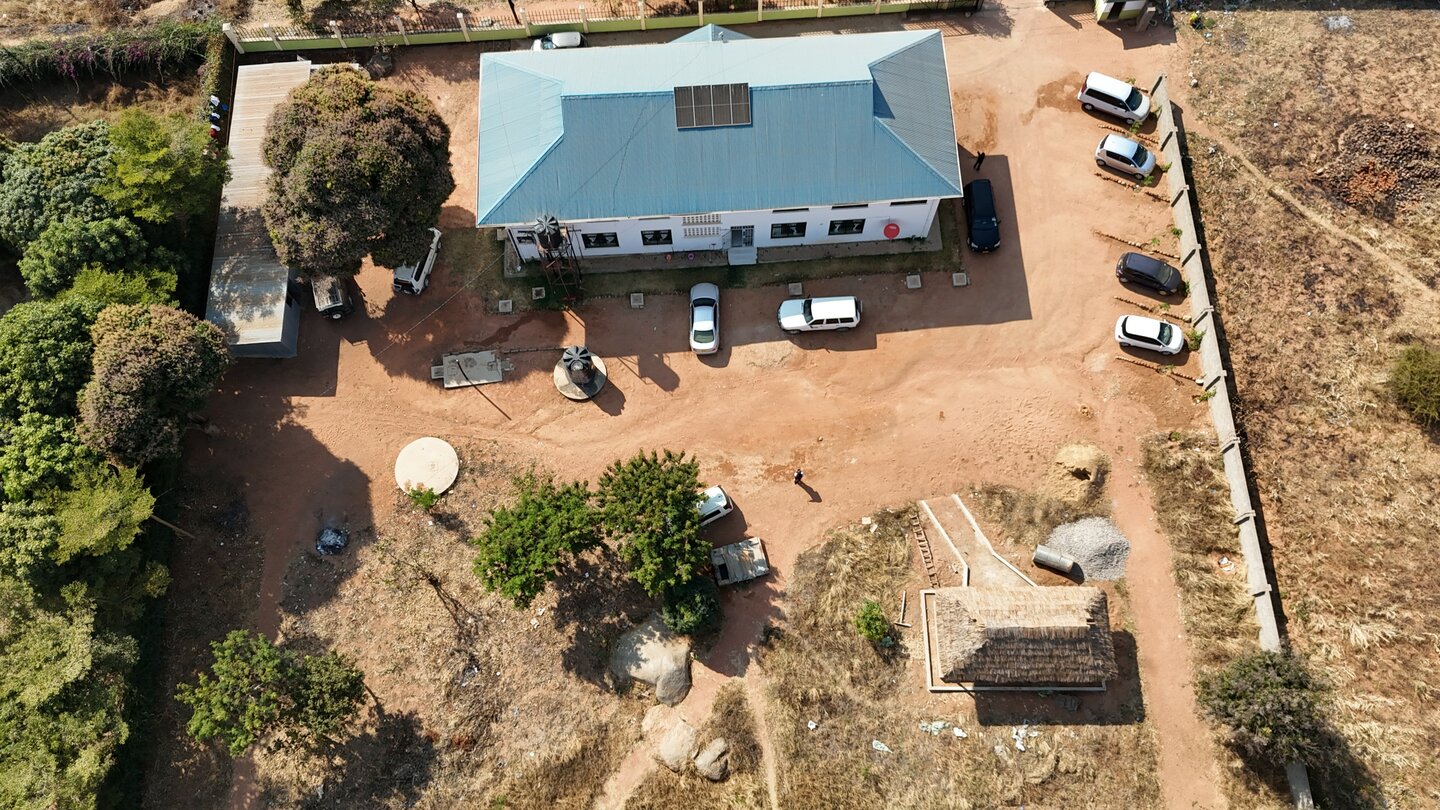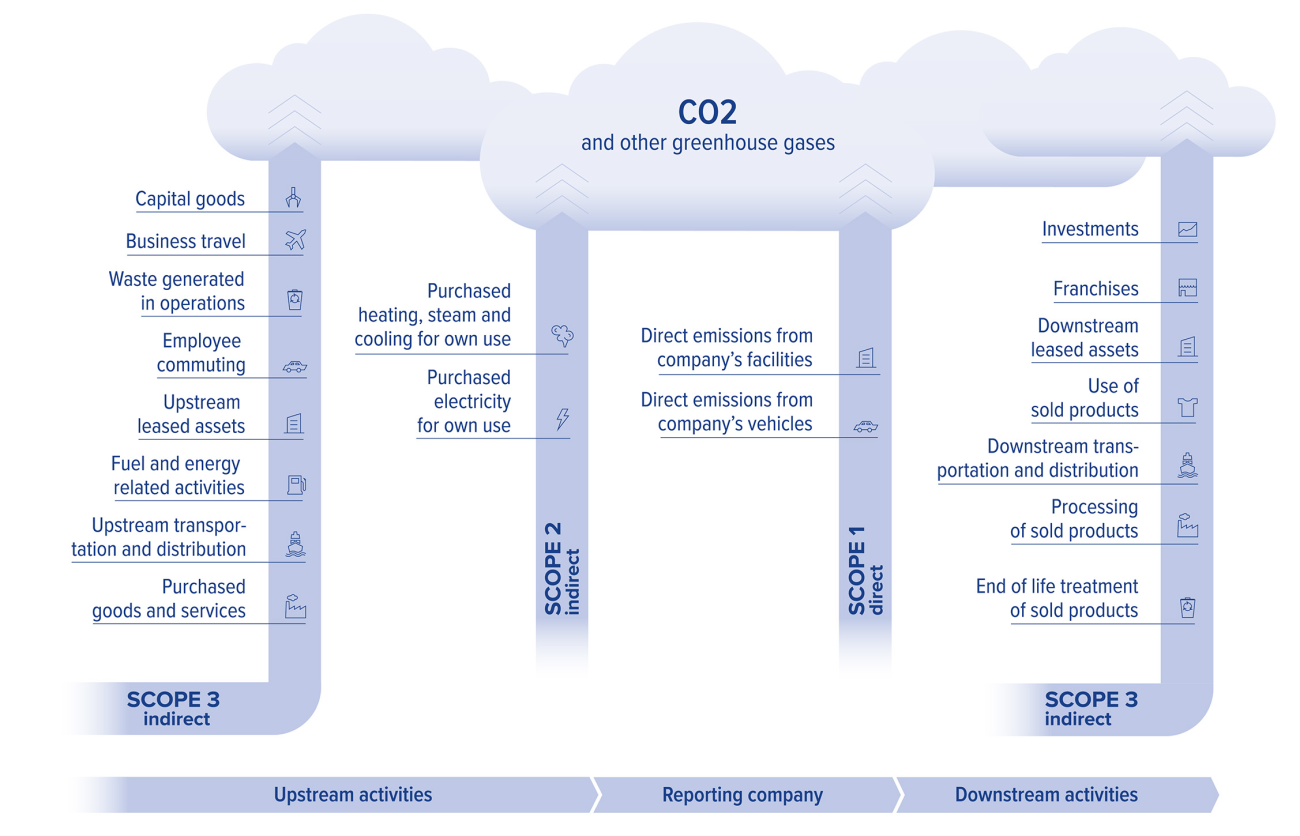Oil, gas, coal and cement companies are responsible for a major portion of greenhouse gas (GHG) emissions globally. But the rest of the world – businesses, governments and also NGOs – contributes as well and needs to identify ways to cut their carbon emissions to combat climate change.
Finding appropriate methods for addressing climate change can be tricky; efforts can be undermined by greenwashing (i.e., exaggerated claims that an activity or project helps the environment). Many businesses and NGOs, including Helvetas, have been using offsets to compensate for their emissions and paying for climate-friendly projects such as planting trees that absorb carbon dioxide (CO2) to offset or “balance” the emissions generated. However, a strategy that is built only on offsetting carbon emissions is no longer recognized as adequate to stop global warming. Offsetting has been increasingly criticized because it tacitly endorses continued emissions (business as-is) rather than incentivizing the reduction of greenhouse gases at their source, as is necessary for us to achieve net zero globally.
Net zero refers to a state in which the greenhouse gases going into the atmosphere are balanced by their removal out of the atmosphere.
The term net zero is important because – for CO2 at least – this is the state at which global warming stops. The Paris Agreement underlines the need for net zero. It requires states to “achieve a balance between anthropogenic (human-caused) emissions by sources and removals by sinks of greenhouse gases in the second half of this century.”
To lead the way to a net zero economy, it is pivotal for organizations to set meaningful emission reduction targets. Organizations may choose to finance additional “mitigation” projects beyond their value chain, but these investments should never replace actions that reduce or eliminate emissions directly. In line with current best practices, Helvetas has adapted its strategy to respond to our own carbon emissions.
Helvetas’ innovative approach to pricing and reducing carbon emissions
Helvetas is committed to a proactive approach to reduce our carbon footprint: In combination with careful analysis, reporting of greenhouse gas (GHG) emissions and the implementation of mandatory measures for daily operations, Helvetas has introduced a Decarbonization Fund which targets in-house projects that reduce our institutional carbon footprint.
Knowing our carbon footprint has been a critical step for meaningful action. Helvetas has been analyzing its emissions in not just the head offices in Switzerland but also in our 30+ partner country offices for more than six years. Unlike other organizations that may focus on only a few emission sources, such as flights, Helvetas collects information on potential sources of carbon dioxide and other greenhouse gases such as methane, collectively referred to as CO2 equivalents (CO2e), in line with the GHG protocol. Data is collected on business travel, staff commuting, energy consumption, use of materials and equipment and waste management. This information serves as a basis for both developing country-level Decarbonization Action Plans as well as endowing Helvetas’ Decarbonization Fund.
In their action plans, Helvetas country offices report on progress towards mandatory green office requirements, including using energy-efficient lightbulbs, making double-sided printing the default, banning single-use water bottles and waste separation. However, substantial changes may require both larger upfront investments as well as increased staff awareness and buy-in.
The Helvetas internal Decarbonization Fund facilitates these activities. With additional financial support, countries can plan and implement long-term improvements. Funds can be used for energy audits to identify ways to reduce heating and electricity, installation of photovoltaic cells on rooftops, workshops for staff sensitization, purchase of bicycles, subsidies for use of public transportation or other relevant activities based on the local context.
Resources for the Fund come from an internal carbon pricing mechanism: Countries are levied, or taxed, 14 CHF ($16) per 1 t CO2e, with funds coming out of any profits the country office makes on its projects. The levy will increase annually through 2030 to generate higher incentives for countries to implement green office practices.
Examples from two countries – North Macedonia and Tanzania – highlight how the Fund facilitates additional decarbonization activities in Helvetas offices.
North Macedonia
Skopje, where Helvetas North Macedonia’s office is located, faces numerous challenges from extreme pollution. In the cold season, air pollution skyrockets due to outdated energy systems and industries that are dependent on fossil-fuels, as well as limited access to sustainable transportation. The summer season comes with heatwaves and temperatures exceeding 40°C that worsen air quality and increase levels of air pollution.
In addition to Helvetas projects that focus on building access to greener employment opportunities, the Skopje office has been implementing its own decarbonization measures. The Skopje team negotiated the installation of an adaptive shading system with the building landlord. With shades and thermo-foils installed on every window, the office became significantly cooler in the summer months, reducing emissions from air-conditioning. Additionally, the office has been greened with plants and live moss panels that act as natural air filters, capturing minute allergens and pollutants without using electricity.
Moreover, with the support of the Decarbonization Fund, the North Macedonia office is in the process of procuring alternative transportation devices for staff members (e-scooters and bicycles) and installing bike racks in public spaces in proximity to the office building. Office Manager Martin Stoshikj is a frequent user of the scooters. “Using the scooter allows me to avoid driving a car, paying for parking and dealing with constant traffic since our office is in the center of Skopje,” said Martin. “This way, I can get my job done more efficiently and with less anxiety.”
Finally, workshops for the employees will take place later in 2024. The team is eager to learn more about opportunities for greening lifestyles and Helvetas operations in the country.
Tanzania
Helvetas Tanzania has multiple offices. Using monies from the Decarbonization Fund, Helvetas Tanzania held a workshop in June 2024 for a range of staff, from project managers and finance officers to cleaning staff. The goals of the workshop were to raise awareness on the measures in the Decarbonization Action Plan, to learn from best practices within the Helvetas Tanzania network and to discuss ways to reduce waste, as well as to develop a new carbon accounting system.

After a presentation from a local plastic bottle recycling expert and entrepreneur, staff reviewed ideas for recycling waste items in their offices that are difficult to dispose of. Staff calculated their own carbon footprints from travel, energy use and diets using an online calculator, then compared their results to the average Tanzanian. In addition, staff proposed additional measures for offices, such as reducing printing, collecting waste for composting and using re-usable containers for takeaway meals.
One important takeaway from the workshop was the need to source locally made products. For example, not importing cheap furniture that is not repairable but instead using locally produced wooden furniture that is durable. The importance of repairing rather than replacing items was stressed.
“We discussed the concept of direct emissions from sources owned or controlled by the organization (Scope 1), as well as indirect emissions from purchased electricity and cooling (Scope 2), and supply chain emissions (Scope 3),” said Samira Cabdulle, the Junior Program Officer who organized the workshop. “The discussions on Scope 3, especially on upstream and downstream emissions, were highly engaging.”

Action items include the creation of a workgroup to finalize new procurement guidelines that focus on sustainability. In addition, PV cells will be installed in all of the offices. Finally, a manual is being developed to provide guidance and standardization for data collection.
Decarbonization challenges faced by development NGOs
Development NGOs generate carbon emissions from energy use, electronic equipment, purchases, travel, supplies provided to affected populations and more. Reduction of carbon emissions is a particular challenge for development organizations with projects in multiple countries in the Global South and elsewhere.
Some humanitarian and development NGOs use large amounts of goods such as medical supplies in their work. Greening the health care sector, including pharmaceuticals and other procurements, has long been championed by Health Care Without Harm.
Another major issue for development organizations is the frequent flights to check on projects and connect with local staff, partners and government officials. Becoming more thoughtful about who flies (one person or a group) and how often (yearly or every two years) can positively impact an organization’s carbon footprint. Nevertheless, it’s clear that video conferencing cannot replace all trips, while travel to rural areas may require multiple flights or use of high-emission vehicles such as diesel trucks or jeeps that can travel over rough terrain.
Three basic steps for getting started with decarbonization
The first step in decarbonizing is data collection. Some NGOs prefer to focus on only the main drivers of emissions, such as flights and energy/heat. However, to comply with the GHG Protocol’s accounting standards, organizations need to include a large range of emission sources. It can be challenging to collect such data retrospectively. Finding ways to embed CO2e values into administrative processes, such as invoice payments, can enable tracking to be done in real-time and more accurately.
The next step is calculating the organization’s carbon footprint. Various consulting firms offer calculation services as well as assistance in developing a carbon reduction plan.
Finally, organizations need to develop an ambitious decarbonization plan that addresses emissions in the head office and country offices. Science-Based Targets provides organizations with a clearly-defined path to reduce emissions in line with the Paris Agreement goals. The aim is to reduce emissions at their source, for example, by changing from traditional heating to geothermal or photovoltaic (PV) or buying refurbished furniture instead of new desks, tables and chairs.
Spearheading change
Reducing emissions at the source in all our offices is one aspect of our organizational plans. We also seek to make our projects transformative towards climate and disaster risk management, climate policy and a green economy.
Helvetas’ approach of pricing emissions and reverting financial resources to the decarbonization process has raised great interest in the NGO sector and may inspire others to follow a similar approach. Helvetas’ Senior Advisor on Climate Change, Maya Wolfensberger, presented about Helvetas’ Decarbonization Fund when the Swiss Agency for Development and Cooperation (SDC) convened NGOs for an exchange of decarbonization strategies and ideas in June 2024.
NGOs need to spearhead change. It is our responsibility as mission-driven organizations to work alongside businesses and governments to reduce the impact of humans on the climate. By gathering data, analyzing it and setting targets that involve better, more informed decisions, NGOs can drive decarbonization and reduce emissions within operational processes, business models and value chains. Together, we can work towards a net zero economy.
About the Authors
Rebecca Laes-Kushner is the Digital M&E Coordinator at Helvetas.
Maya Wolfensberger is a Senior Advisor for Climate Change at Helvetas.
Anastasia Bekish is the Regional Coordinator for Environment and Climate Change at Helvetas Eastern and Southeastern Europe.

